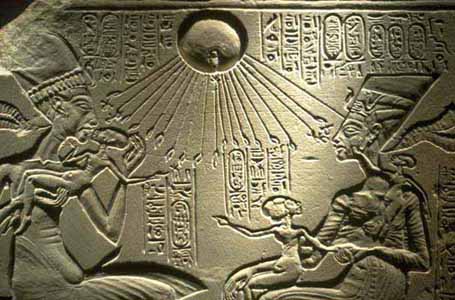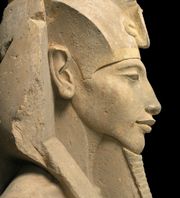|

Final Perspectives
Who was Akhenaten? What did he teach? What did he really
think and feel? What kind of personality did he have? What was his impact on the world? While we may not have definitive answers
to these questions, we can consider some of the major points of contention and try to put them in context.
There is
a general belief that Akhenaten considered himself the sole intermediary between the one true god and all mortals, and that
others must approach god through him. The evidence cited for this belief is the royal depiction of the rays of the Aten solar
disk reaching down, with the hand on one ray holding an ansated cross, or ankh, to Pharaoh Akhenaten's nostrils. But since
the nostrils are an opening for the breath that brings life and conscious awareness, and the ankh is a symbol for eternal
life, this depiction may simply indicate that Akhenaten was conscious of his connection with God and aware of the eternal
life this conveyed. Queen Nefertiti is similarly depicted, so he is not alone in this respect.
The rays of the Aten
extend to all and likewise end in hands, but without the ankh. Is this not suggestive? There are the rays of the symbol of
god with hands reaching out, and there are the openings or nostrils of people who live and breathe with consciousness. The
only thing missing is the individual ankh, and thus, knowledge and awareness of the connection with God and eternal life.
Akhenaten has been both admired and condemned for his individuality and complete devotion and faithfulness to his
worldview resulting from his education, training for the priesthood, and apparent mystical experiences. And yet, this is exactly
what the role of pharaoh, incarnation of god on earth, was purported to be. It is almost as if he fulfilled his role too well,
and the established priesthood and organs of state, used to a kind of power-sharing and mutual support, found their god-on-earth
moving them in a direction they did not want to go.
The active suppression of the worship of Amun and sacred objects
of worship is an intriguing matter. It may indicate Akhenaten's intolerance for views other than his, but the political power
and influence of the priesthood of Amun may also have been a factor. Akhenaten, as leader and guardian of his people, might
have judged the potential misconceptions and errors caused by the worship of material things as more dangerous than their
destruction.
Akhenaten, in his worship of the solar disk Aten, symbol of the unseen one true god Ra, is considered
perhaps the first proponent of monotheism. His bold actions and faithfulness to his mystical experience make him stand out
as a true individual. Today, the Rosicrucian Order, AMORC perpetuates many of the traditions and philosophies of the
Mystery Schools in existence during Akhenaten's reign.
Many scenes depict Akhenaten and his family in loving,
tender, and intimate contact and settings. Through his decrees, construction of Akhetaten, and worship of the Aten, we find
a deep love of nature and sincere worship of the divine. He both boldly declares his actions and relationship with God and
prostrates himself in humility before the divine.
A wonderful insight into his soul-personality is found in his poem
The Great Hymn to the Aten. In this translation of this moving work, Akhenaten expresses his deep adoration for the
living Aten.
The Great Hymn to Aten
 Splendid you rise in heaven's
lightland,
O living Aten, creator of life!
When you have dawned in eastern lightland,
You fill every land with
your beauty.
You are beauteous, great, radiant,
High over every land;
Your rays embrace the lands,
To the
limit of all that you made.
Being Re, you reach their limits,
You bend them for the son whom you love;
Though
you are far, your rays are on earth,
Though one sees you, your strides are unseen.
When you set in western lightland,
Earth is in darkness as if in death;
One sleeps in chambers, heads covered,
One eye does not see another.
Were
they robbed of their goods,
That are under their heads,
People would not remark it.
Every lion comes from its
den,
All the serpents bite;
Darkness hovers, earth is silent,
As their maker rests in lightland.
Earth
brightens when you dawn in lightland,
When you shine as Aten of daytime;
As you dispel the dark,
As you cast your
rays,
The Two Lands are in festivity.
Awake they stand on their feet,
You have roused them;
Bodies cleansed,
clothed,
Their arms adore your appearance.
The entire land sets out to work,
All beasts browse on their herbs;
Trees, herbs are sprouting,
Birds fly from their nests,
Their wings greeting your ka.
All flocks frisk on
their feet,
All that fly up and alight,
They live when you dawn for them.
Ships fare north, fare south as well,
Roads lie open when you rise;
The fish in the river dart before you.
Your rays are in the midst of the sea.
Who
makes seed grow in women,
Who creates people from sperm;
Who feeds the son in his mother's womb,
Who soothes him
to still his tears.
Nurse in the womb,
Giver of breath,
To nourish all that he made.
When he comes from the
womb to breathe,
On the day of his birth,
You open wide his mouth,
You supply his needs.
When the chick in
the egg speaks in the shell,
You give him breath within to sustain him;
When you have made him complete,
To break
out from the egg,
He comes out from the egg,
To announce his completion,
Walking on his legs he comes from it.
How many are your deeds,
Though hidden from sight,
O Sole God beside whom there is none!
You made the earth
as you wished, you alone,
All peoples, herds, and flocks;
All upon earth that walk on legs,
All on high that fly
on wings,
The lands of Khor and Kush,
The land of Egypt.
You set every man in his place,
You supply their
needs;
Everyone has his food,
His lifetime is counted.
Their tongues differ in speech,
Their characters likewise;
Their skins are distinct,
For you distinguished the peoples.
Translated by J.A. Wilson in ANET, pp. 369-371
Sources
Akhenaten and Tutankhamen: The Religious Revolution, by Susanna Thomas
Ancient Egypt, by Don Nardo
Ancient Egypt, by David P. Silverman
Akhnaton, False Prophet, by Cyril Aldred
Akhnaton: King of Egypt, by Cyril Aldred
Nefertiti, by Joyce Tyldesley
http://www.digitalegypt.ucl.ac.uk, Digital Egypt for Universities
http://www.maat.sophiatopia.org, Ancient Egypt: Great Hymn to the Aten
|

